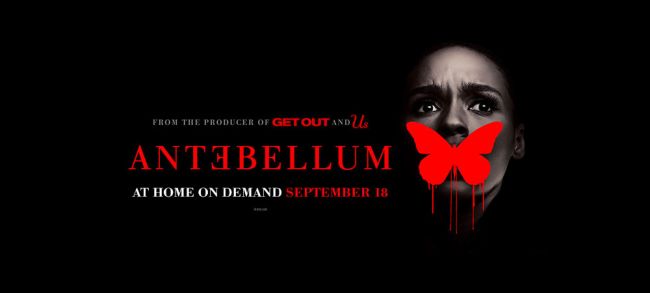
From Lionsgate
When I first saw the trailer for the film “Antebellum,” I, among many other viewers, was convinced that the film was going to take a supernatural twist on the horrors of slavery. Unfortunately, when I was finally able to watch the film, I was sorely disappointed to discover that it was anything but that.
Directed and written by Gerard Bush and Christopher Renz, the horror/thriller “Antebellum” was released on video on demand Sept. 18, 2020. According to IndieWire, the film’s opening weekend proved to be very successful on VOD, with it scoring “the first top studio PVOD release since ‘Bill & Ted Face the Music.’” Despite it being the most rented film on both FandangoNow and AppleTv, the film never made back its budget, instead making only an abysmal $1.8 M from its $15 M budget.
“Antebellum” opens on an eight minute long establishing shot of a Civil War era plantation, where half of the film takes place. It starts with a tracking of a young white girl skipping through the plantation before panning over numerous enslaved people subjected to hard physical labor amidst marching Confederate soldiers. In this long sequence shot, we first see our main protagonist, Eden, played by Janelle Monae, waking up slumped over a horse. She looks confused as to where she is. In the last minutes of this continuous shot, we see an enslaved Black man with a slave collar around his neck screaming in horror as an enslaved Black woman, his lover, tries to flee before a noose loops around her neck and violently whips her back. A Confederate soldier shoots and kills her as her lover is forced to watch.
All of this, in the span of eight minutes. It sets the tone for what follows through the rest of the hour and 45 minute film, needless violence and Black trauma. In the first 40 minutes of watching, I saw nothing but enslaved Black people subjected to cruelty, torture, rape and subjugation. One scene shows a pregnant enslaved woman having a miscarriage in the middle of the cotton field; another scene shows the Black man from the first scene in the beginning discovering the ashes of his lover in a crematorium. One could argue that it’s almost as if that’s what chattel slavery really was, a constant onslaught of trauma and horror.

From Lionsgate
I would be remiss if I didn’t acknowledge the truth in that statement. Any sane person can realize and acknowledge the fact that chattel slavery was an atrocity, a stain on American history. The horrors of slavery are still ignored to this day. Zaraya Tollerson-Irby, psychology major, criminology minor, and 2020 graduate, said, “I feel like watching it gives us only a glimpse of the actual trauma that our ancestors went through. There’s a lot of Black and brown people that don’t know the actual truth.” Despite this, how is it that a film meant to bring a mirror up to the horrors of Civil War era slavery manages to be so exploitative and shallow?
When it seems as though the exploitative violence and abuse that these enslaved people are enduring just will not end, after being raped by her slave master, Eden wakes up in the modern world as Veronica. She’s a successful author and sociologist, living in a high-end loft with her husband and daughter. Throughout the second act, the film just shows Veronica living her best life, a clear juxtaposition from the trauma of the first act. While on a promotional tour in Louisiana, after having dinner with her friends, Veronica gets into a car which she believes is her Uber (can we just take a moment to acknowledge that no one in today’s world wouldn’t check the license plate before getting into a car), she ends up being knocked out by one of the Confederates, Captain Jasper, played by Jack Huston. This brings us into the third act, where Veronica/Eden is back on the plantation.
For those who have not seen nor heard anything about “Antebellum,” I won’t spoil the rest of the film, especially its notorious “twist” ending. However, what I will say is that the ending personally reminded me of “The Village” with a “Get Out” edge to it.

My biggest gripe with “Antebellum” is its pacing and structure. For anyone who’s seen the trailer, it gave many viewers the impression that it was a supernatural/time loop slave narrative. It reminded me of “Kindred” written by Octavia Butler and the 1993 Ethiopian film “Sankofa.” Both stories incorporate the use of time travel in slave narratives, and overall, portray chattel slavery in a much more empathetic, non-exploitative manner. “Antebellum” does not. What “Antebellum” instead does is miss the mark on what truly scares black American audiences of today.
“I felt like the film was just redundant,” Naiser Robinson-Warren, president of Cabrini’s Black Student Union and sophomore double major in Black studies and communications, said. “It didn’t highlight any new arguments.”
Black horror is definitely having a moment right now, and has been since “Get Out,” written and directed by Jordan Peele, made its debut back in 2017. What films like “Get Out”, “Us” and “Sorry to Bother You” have achieved from showing the present-day horrors Black Americans experience through the lens of social thriller, “Antebellum” chooses to literally regress back to what more Black Americans have been criticizing the film industry on portraying for years: slave narratives.
Instead of adding anything new to the table, “Antebellum” is just another sloppily structured, poorly paced thriller with its only slight edge being a slave narrative that many people are already tired of seeing.
“For me, it was like a ‘Get Out’ part two, minus the subtlety and nuance of what that movie good in the first place,” said Dr. Zakia Gates, assistant professor of education.
“I thought that the film was unnecessary,” said Robinson-Brown.
One positive thing I will say is that Janelle Monae’s acting in this film is brilliant. Though many of the other actors were, in my opinion, trying a bit too hard in a film that itself wasn’t even trying hard, Monae managed to bring enough of a great performance to make the film semi-watchable.


